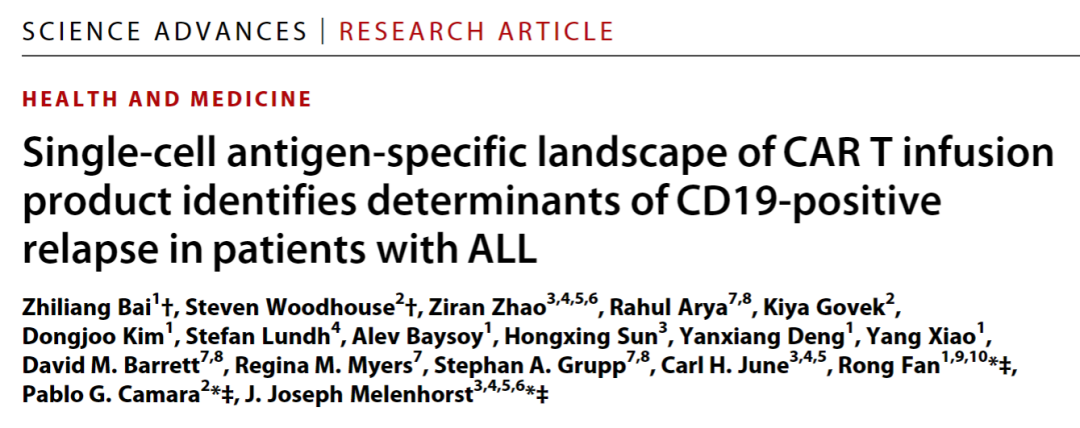Chimeric antigen receptor T-cell (CAR-T) immunotherapy targeting CD19 has achieved surprising results in the treatment of malignant hematological tumors such as relapsed/refractory acute lymphoblastic leukemia (ALL). Clinical trial data show that the complete response rate of patients receiving CAR-T therapy can reach 70-90%. At present, the United States Food and Drug Administration (FDA) has approved 6 autologous CAR-T cell products for the treatment of blood cancers such as leukemia, lymphoma and multiple myeloma. A large number of clinical results have proved that this personalized therapy has great anti-cancer potential and is relatively safe without risk of immune rejection, bringing hope to many cancer patients around the world.
However, follow-up investigations show that 30-60% of patients suffer the relapse within one year after CAR-T reinfusion. According to the expression of cancer cell surface antigens, recurrence can be divided into two categories: CD19-negative and CD19-positive. The former is mainly caused by the loss or down-regulation of CD19 expression in cancer B cells, while the molecular mechanism of the latter is unclear.
On June 8, 2022, the team of Professor Rong Fan from the Department of Biomedical Engineering of Yale University, in collaboration with the team of J. Joseph Melenhorst and Pablo G. Camara of the University of Pennsylvania, published a paper in the journal Science Advances entitled “Single-cell antigen-specific landscape of CAR T infusion product identifies determinants of CD19-positive relapse in patients with ALL”.
The study performed single-cell precision analysis of more than 100,000 pre-infusion CAR-T cells with 4-1BB structure from 12 patients with relapsed/refractory B-ALL, and revealed a loss of Th2 function in CD19-positive relapsed patients.
The results were further validated in the characterization of CAR-T functional properties in 49 patients by independent flow cytometry and other assays.
According to the clinical response of the patients, the research team divided the 12 patients into a long-term complete remission group (CR, no relapse for more than 54 months, n=5), a CD19-positive relapse group (RL, median time to relapse=9.6 months, n=5) and the non-responder group (NR, n=2), and got the genome-wide transcriptome and 14 kinds of surface proteome information of CAR-T cells under the conditions of non-activation, CD19 antigen-specific activation, T cell receptor activation, and non-target activation.
Through the analysis of cytokine co-expression modules, the research team first found that under antigen-specific activation conditions, Th2 cells were concentrated in the CAR-T-enriched areas in the CR group, and the proportion of Th2 modules in the CR group was significantly higher than that of the RL group. Analysis of highly differentially expressed genes further identified the upregulation of Th2-related cytokines IL4, IL5, and IL13 in the CR group and marked activation of the Th2 pathway.
Next, cluster analysis of CAR-T cell sets from CR and RL patients identified 8 subpopulations with unique transcriptomic signatures, of which cells in subpopulation 4 had prominent Th2 function. Through the cell proportion statistics, it was found that the proportion of CAR-T in subgroup 4 in the CR group was significantly higher than that in the RL group. In addition, from the single-cell expression distribution dot plot of IL4, IL5, IL13, and the transcription factor GATA3 that dominates Th2 cell differentiation, the data of the five patients in the CR group were significantly higher than the RL group in terms of expression levels and expression frequencies.
To verify the above findings, the research team additionally characterized the CAR-T cells of 49 B-ALL patients, of which 26 patients had a median recurrence-free complete response of 33.7 months, and the other 23 patients developed CD19-positive recurrence at a median of 9.3 months. The researchers independently performed intracellular flow analysis (University of Pennsylvania) and other assay (Yale University), both of which together confirmed the absence of Th2 function in the RL group.
This study identifies the important role of Th2 function in maintaining long-term remission of CAR-T, revealing the current CD19-positive relapse mechanism in the field of CAR-T cell immunotherapy, provides target genes and clarifies key pathways for predicting response and screening patients in clinical practice, and provides a theoretical basis for improving CAR-T efficacy and treatment effects.
Reference
1. Bai, Zhiliang, et al. “Single-cell antigen-specific landscape of CAR T infusion product identifies determinants of CD19-positive relapse in patients with ALL.” Science advances 8.23 (2022): eabj2820.

